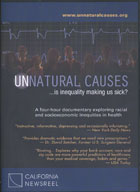
Unnatural Causes: Is Inequality Making Us Sick? 2008
Distributed by California Newsreel, Order Dept., PO Box 2284, South Burlington, VT 05407; 877-811-7495 (toll free)
Produced by California Newsreel with Vital Pictures
Directed by Llewellyn M. Smith, James Rutenbeck, Eric Stange, Randall MacLowry, Ellie Lee, Patricia Garcia Rios, Maria Theresa Rodriguez
DVD, color, 1 DVD, 7 films, 30 - 55 min.
College - Adult
Health Sciences, Public Health, Epidemiology, Multicultural Studies, Socioeconomic Studies, Economics, Political Science, Sociology, Medical Anthropology
Date Entered: 10/30/2008
ALA Notable: ALA.gif
Reviewed by Lori Widzinski, Health Sciences Library, University at Buffalo, State University of New York
This four-hour epic documentary, which aired on PBS in the spring of 2008, uncovers how race, gender and socioeconomic status influence our overall health. The first and longest (55 min.) of seven episodes, In Sickness and in Wealth, provides an overview and sets the tone for the series. Loaded with staggering, sobering statistics, this one-hour film profiles citizens in various socioeconomic groups and equates them with studies proving that social factors carry more weight in our overall health than our genes. Unfortunately in our country wealth and race impact many of the things responsible for good health such as nutrition, where we live, and how we treat each other. Social factors then manifest biologically into chronic stress, increasing the amount of cortisol and adrenaline that flow through our bloodstream, creating a host of disease states in the body.
The remaining six episodes focus on the various issues that create chronic stress in our society.
Episode two, When the Bough Breaks, looks at the effects of racism on African American infant mortality rates. Two Chicago physicians noticed African American infant mortalities and pre-term births numbering twice that of white patients. Their study revealed that the chronic stress of dealing with gendered racism over the lifetime of the mother is a risk factor, regardless of income. Stress hormones affect pregnancy in many ways, and the goal is to reduce or remove those stressors.
Becoming American, episode three, is a fascinating look at how the health of recent immigrants to the U.S. declines the longer they stay here. Not only does this affect the people and communities involved, but the entire health care system. Studies show that the Mexican immigrants profiled in this film, are not only in better physical health when they arrive here, but that the close family ties of the Latino culture form a protective shield around them. This only lasts so long, however, before they too experience declining health from a generally lower socioeconomic standing in the U.S.
Episode four, Bad Sugar, profiles the Native Americans living in southern Arizona with skyrocketing rates of diabetes. Being displaced and forced to live on reservations followed by years of oppression and poverty have taken their toll on entire native communities. A National Institutes of Health study proved a direct biochemical connection between poverty and diabetes. This is a disheartening look at the plight of the southwestern native tribes. While rebuilding is beginning, it looks to be a long process.
The importance of place continues in Episode five, Place Matters. The effect of where you live astoundingly impacts your overall health and life expectancy. Looking at two west coast disadvantaged communities, it is easy to see the domino effect of chronic stress on an entire neighborhood. Your neighborhood determines your exposure to environmental chemicals, healthy foods, social culture, violence and other stressors that leave residents with a sense of loss of control. Rates of heart disease and diabetes are dramatically higher in poorer neighborhoods. How do people gain more control of their surroundings? How can they influence health policy?
,em>Collateral Damage, episode six, is a distressing glimpse at life in the post-colonial Marshall Islands. Dominated by the U.S. military base on Kwajalein, residents of the islands are strictly segregated, living in squalid overcrowded conditions that are in stark contrast to the Americans living on the base in a seeming island paradise. Losing their connection to the natural world, as well as battling an influx of Western diseases, the native islanders struggle to remain healthy.
The final film in the series, Not Just a Paycheck, examines the impact of job loss on residents in Western Michigan. (A situation that will no doubt be growing across the country in our current economic crisis.) External life events create anxiety and stress, creating an increase in metabolic changes, kidney disease, heart disease and diabetes. This episode examines the concept of excess deaths, those deaths over and above what is normally expected, and how that relates to external stressors. It also compares the U.S. health care and unemployment system with that of Sweden.
All the films in the series have high production values. The producers and directors have created a fascinating classic series on health in America that is eye-opening, maddening, and at times embarrassing. This reviewer would have enjoyed seeing a response from congressional representatives and policy makers in response to several of the issues discussed, for a slightly more balanced view. This series also makes crystal clear the interconnectedness of life on our planet.
Unnatural Causes has two related web sites that offer additional resources: one for the film itself and one from PBS. They have different information so it is worthwhile to check both. This series belongs in every academic library collection. Educators will make good classroom use of the individual films, all of which, with the exception of In Sickness and in Wealth, are around 30 minutes in length. Highly recommended for collections supporting programs in the health sciences, particularly public health, economics, sociology, social work, and political science.